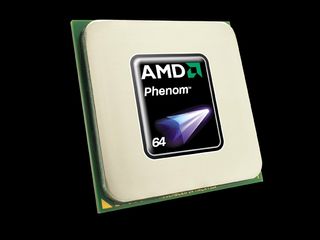Phenom: AMD's next-gen desktop CPU
Phenom's the name, bashing Intel's Core 2 processor is the g

May we introduce Phenom. It's the official brand name for AMD's upcoming quad-core desktop chip, due out later this year. For now, this latest quad-core announcement by AMD is purely a marketing exercise.
Apart from revealing the slightly adolescent-sounding Phenom brand name, AMD has not released much by way of further architectural details of its new quad-core architecture.
But it has confirmed that mainstream variants of new Phenom range will be available in socket AM2 configuration. Phenom processors will therefore be backwards compatible with existing AM2 motherboards.
However, only as-yet-unreleased motherboards with the upcoming AM2 socket will support certain advanced features such as HyperTransport 3 and independent voltage controls for the CPU cores and the chip's on-die Northbridge.
Native quad-core
AMD has also confirmed that the Phenom desktop chip will effectively be a dead ringer for its Opteron server sibling.
In other words, it will be the first native quad-core desktop PC processor. Intel's quad-core chips, by contrast, are constructed using a pair of dual-core CPUs crammed into a single package.
AMD has previously revealed that its upcoming quad-core design is a development of the existing processor core as found in the Athlon 64 and Opteron CPUs. Key enhancements include a big boost in floating point performance, support for SSE4 instructions and a 2MB shared cache memory pool.
Get daily insight, inspiration and deals in your inbox
Get the hottest deals available in your inbox plus news, reviews, opinion, analysis and more from the TechRadar team.
As for Phenom's performance, AMD will only say that it will be up to 40 per cent faster than the "competition". To which we retort: if Phenom manages to beat the latest Penryn revision of Intel 's Core 2 CPU, it will be a sensational chip.
Phenom processors will be available in the second half of 2007. However, pricing and precise launch date information has not been divulged.
Tech.co.uk was the former name of TechRadar.com. Its staff were at the forefront of the digital publishing revolution, and spearheaded the move to bring consumer technology journalism to its natural home – online. Many of the current TechRadar staff started life a Tech.co.uk staff writer, covering everything from the emerging smartphone market to the evolving market of personal computers. Think of it as the building blocks of the TechRadar you love today.
